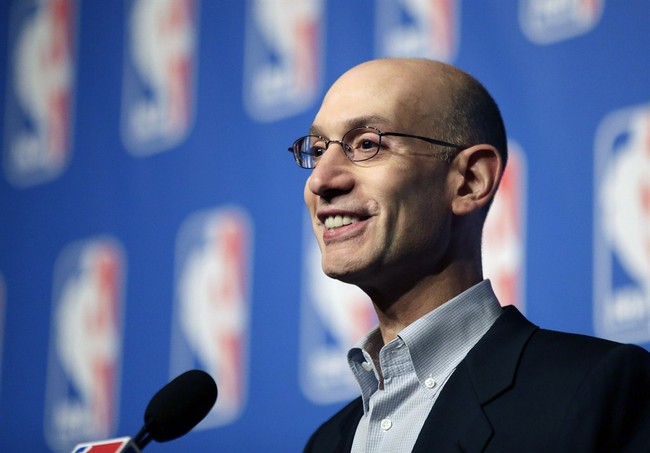
The Market Has a Scoreboard
NBA Commissioner Adam Silver believes WNBA players “deserve” a big pay increase in their next collective bargaining agreement.
While speaking of progress, equality, and recognition, the words were uttered with confidence, maybe even pride; these are all noble ideas. Yet sports, much like life, have a single, unflinching referee: the market.
The current salary cap for the WNBA is a wee bit over $1.5 million per team, with around $250,000 allocated to the top players, and Silver said those numbers should substantially rise.
Yet for all the talk of “deserve,” the league is still dependent on the NBA’s financial umbrella to stay open; it’s nothing cruel, just basic math. Sentiments can’t rewrite balance sheets.
Professional sports, despite the rivalries, excitement, and a fan’s appreciation of a star’s power, are entertainment economics. You learn what an audience values by looking at the numbers. The NBA draws millions of nightly viewers, generating tens of billions in global revenue.
By comparison, the WNBA has been making progress, but the margins between the leagues in attendance, sponsorships, and merchandise sales are astronomical.
At this point, a writer without any competitive blood, scars, or limps might say, “The product isn’t bad; it’s just not what the majority of consumers are buying.”
Bollocks.
This summer, I spent a few minutes watching a WNBA game and had to turn it off. It reminded me of my middle daughter’s middle school basketball games in quality, results, and, sadly, attendance.
I sincerely wish that was an exaggeration.
I watched Angel Reese drive the lane and shoot. Miss. Grab the board. Shoot. Miss. Grab the board. Shoot. Miss. Grab….
You get the idea.
The Economics of “Deserve”
Deserve is a lovely, everyday word used in conversation, but for a business model, it’s poison.
As good intentions go, saying teachers deserve NBA money, nurses deserve CEO benefits, and the cafe down the street, especially the one with incredible omelets, deserves Michelin stars is easy to say.
Unfortunately, there’s something called “the world,” where pay is determined by demand rather than decency. In the world of professional sports, the amount people are willing to spend to watch, wear, or sponsor must align with what they deserve.
Silver insists it’s about “absolute” numbers, not percentages, and that schmaybe could be true. But if salaries double while revenue doesn’t, something’s got to give. Odds are that somebody needs to foot the bill, and it won’t be the market.
It’s lousy math like this that turns subsidies into habits. The NBA’s long and deep shadow will bear the brunt of any salary increase, not because it’s profitable, but because it’s political and public relations gold.
The result of such a dynamic creates an odd economy: symbolic virtue on one side, capitalist arithmetic on the other. That contradiction will float for a while, but eventually, the waterline will meet the hull.
Growth Is Real, But So Are Limits
Regardless of the reasons behind how the league picked it up, there’s no denying the WNBA has momentum. Viewership is up, expansion is close, and a new TV deal could pour billions into the league’s coffers over the next decade, which is meaningful, but even with the surge, it’s still operating from a tiny base.
It’s only fair to pay players more as the league grows. Paying those players as if the league is on par with the NBA is fantasy. The thing that investors, owners, and sponsors need to see now isn’t charity; it’s proof of sustainability. What’s an easy measure of sustainability?
- Do fans show up beyond viral moments?
- Do jerseys sell in the offseason?
- Do franchises in smaller markets survive without the NBA’s backup?
If the answers to those questions turn into yes, then the raises won’t simply be justified, they’ll be long overdue.
But if those metrics stay flat, and salaries still rise, then the WNBA starts to resemble an academic department funded for optics, not outcomes.
Lessons From the Open Market
Regardless of sport, every successful league shares a universal principle: competition breeds value.
The NFL, MLB, and NBA each moved through decades of financial growing pains before players struck gold. Those athletes didn’t earn their success through proclamations of equality; they achieved it by producing a product that fans couldn’t ignore.
There were years where the NBA faced lean times with finals games aired on tape delay (especially the late, West Coast games) and arenas half-filled with indifference.
The big three changed all that: Magic, Bird, and Jordan performed legendary feats with electric skills, not press conferences. One day, stars of the WNBA could do the same, but until that day, the economies of scale can’t simply be willed into existence.
It’s not that markets don’t hate fairness.
They simply don’t care.
Final Thoughts
Silver’s optimism is admirable; he sees potential, and maybe he’s correct. But there’s no sentiment in the market; it’s as honest as a talkative three-year-old (at least my three daughters).
If, and when, the WNBA delivers what the public craves, then money will chase it as hard as Robert De Niro seeks relevancy.
If it doesn’t, then “deserve” becomes a slogan, not a standard. Like William Munny told Little Bill before clearing Daggett’s sinuses, “Deserve’s got nothin’ to do with it.”
The laws of economics don’t bend for applause; they keep score like a scoreboard that never resets, whether you’re playing in Madison Square Garden or half-filling a mid-season matinee game in Seattle. Regardless of what Adam Silver or any talking head says, the next chapter for the WNBA doesn’t depend on speeches or sympathy.
It only depends on whether or not fans decide the product is worth paying for.
The Market Always Tells the Truth
It’s easy to cheer for ideals. It’s harder to accept the math. When leagues treat applause as revenue, the game stops being sport and starts being theater. PJ Media doesn’t clap along; we ask who’s buying the tickets. Join us as we keep score where others move the goalposts. Use promo code POTUS47 to get 74% off your VIP membership. Click here!











